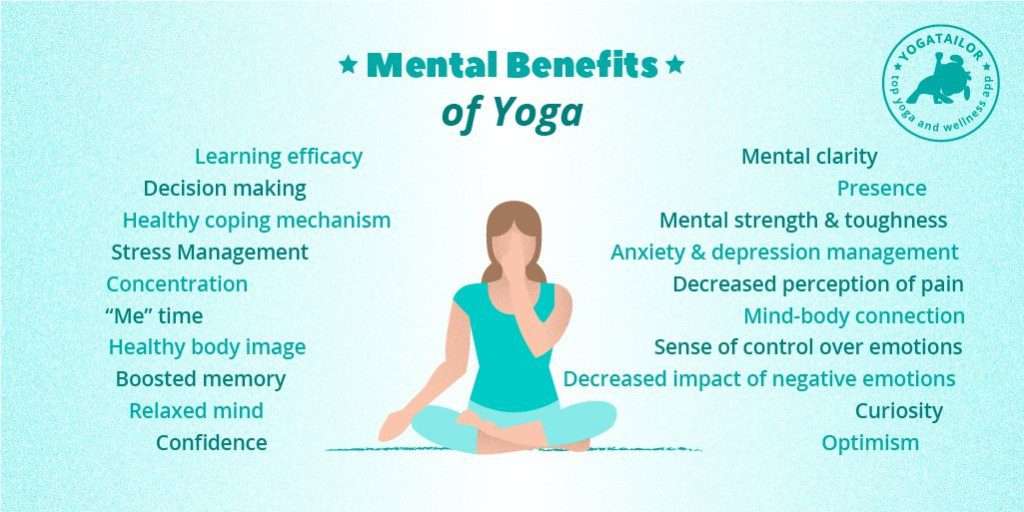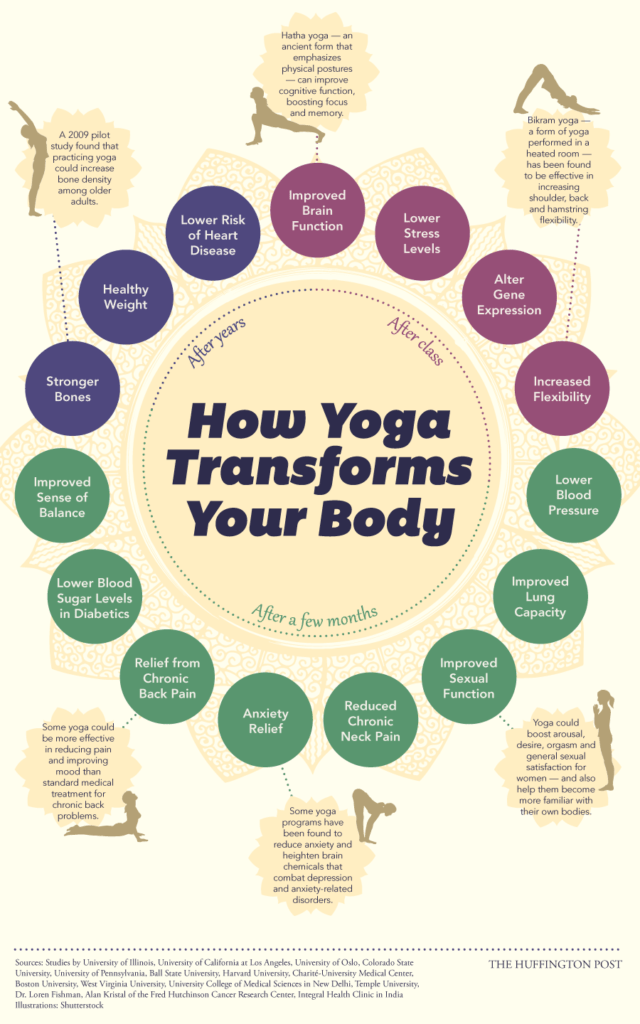So you’ve heard about yoga and its numerous benefits, but have you ever wondered how exactly it benefits both the mind and body? Yoga is not just a series of stretches and poses; it’s a holistic practice that combines physical movement, breathing techniques, and mindfulness to promote overall well-being. By focusing on conscious breathing and holding various poses, yoga can help calm the mind, reduce stress, increase flexibility, improve strength, balance, and posture, and even boost overall mental clarity. In this article, we will explore the different ways yoga benefits both your mind and body and why it has become such a popular practice for achieving physical and mental wellness.

Physical Benefits of Yoga
Increased Flexibility
Yoga is renowned for its ability to improve flexibility. Through various stretching exercises and poses, yoga helps to lengthen and loosen the muscles, allowing for increased range of motion. As you continue to practice yoga regularly, you will notice that your flexibility gradually improves, making it easier to perform daily activities and reducing the risk of injuries.
Improved Strength
While yoga may not be associated with lifting heavy weights, it is a fantastic way to improve your overall strength. Many yoga poses require you to support your own body weight, which helps to build and tone muscles. As you engage in regular yoga practice, you will notice enhanced muscle strength throughout your body, particularly in your arms, legs, and core.
Enhanced Balance
Balance is an important component of physical fitness, and yoga can greatly contribute to improving it. Many yoga poses require you to maintain stability and hold certain positions, which challenges your balance and strengthens the muscles responsible for it. With regular yoga practice, you will find yourself achieving better balance, which can reduce the risk of falls and enhance your overall coordination.
Better Posture
In today’s sedentary lifestyle, poor posture is a common issue that can lead to a variety of musculoskeletal problems. Fortunately, yoga can help correct and improve posture. By practicing yoga, you develop stronger core muscles, which support proper alignment and reduce strain on the spine. As a result, you will find yourself naturally sitting and standing with better posture, alleviating back and neck pain.
Increased Endurance
Endurance is the ability to sustain physical activity for an extended period without fatigue. Yoga, being a low-impact exercise, may not appear to improve endurance significantly; however, it does play a role in building stamina. As you flow through different yoga sequences and hold poses for longer durations, your muscles and cardiovascular system are challenged, gradually increasing your endurance levels.
Improved Breathing
Deep, controlled breathing is a fundamental aspect of yoga practice. Through specific breathing exercises, known as pranayama, yoga helps to expand lung capacity and improve overall respiratory function. The increased oxygen intake during yoga practice not only enhances physical performance but also promotes a sense of relaxation and calmness.
Enhanced Immune System
Regular yoga practice has been found to have a positive impact on the immune system. Numerous studies have shown that yoga stimulates the production of important immune cells, increases the effectiveness of antibodies, and reduces inflammation in the body. By strengthening your immune system through yoga, you can protect yourself from various diseases and promote overall health and well-being.
Weight Management
Yoga can be a beneficial component of weight management. While it may not be as intense as other cardiovascular exercises, yoga can still contribute to calorie burning and weight loss. Additionally, yoga helps to cultivate mindfulness, which can reduce emotional eating and promote a healthier relationship with food. The combination of physical activity and mindfulness can support healthy weight management.
Improved Digestion
Yoga practice can have a positive impact on digestion and gastrointestinal health. Certain yoga poses and twists stimulate the digestive organs, improving blood flow to the abdomen and enhancing the absorption and elimination of nutrients. Additionally, the relaxation and stress-relieving benefits of yoga can alleviate digestive issues such as indigestion, bloating, and constipation.
Lowered Blood Pressure
High blood pressure, or hypertension, is a significant risk factor for cardiovascular disease. Yoga has been shown to help lower blood pressure by promoting relaxation and reducing stress. The gentle movements, deep breathing, and mindfulness practiced in yoga help to calm the nervous system and regulate blood pressure levels. Regular yoga practice can contribute to better overall cardiovascular health.
Mental and Emotional Benefits of Yoga
Reduced Stress and Anxiety
One of the most recognized benefits of yoga is its ability to reduce stress and anxiety. The combination of physical movement, controlled breathing, and mindfulness techniques in yoga helps to activate the relaxation response in the body, reducing stress hormones and promoting a sense of calmness.
Improved Mood and Emotional Well-being
Yoga is known to have mood-boosting effects. Regular practice can elevate levels of serotonin, a neurotransmitter responsible for feelings of happiness and well-being. Additionally, engaging in yoga classes can provide a social support network and a sense of community, which can greatly contribute to improved emotional well-being.
Enhanced Concentration and Focus
Yoga requires a certain level of concentration and focus, which can translate into improved cognitive abilities outside of the practice. By cultivating mindfulness and learning to redirect your attention to the present moment during yoga sessions, you can enhance your concentration and focus in various aspects of life.
Increased Mindfulness
Mindfulness is the practice of bringing one’s attention to the present moment without judgment. Yoga serves as a powerful tool for cultivating mindfulness. By focusing on the breath and body sensations during yoga poses, you develop the ability to stay present and aware in everyday life, reducing feelings of stress and enhancing overall well-being.
Better Sleep Quality
Yoga has been shown to enhance sleep quality and reduce insomnia. The combination of physical activity, relaxation techniques, and mindfulness practiced in yoga can calm the mind and relieve tension in the body, promoting a more restful sleep. Regular yoga practice can help establish a healthy sleep routine and improve the overall quality of your sleep.
Boosted Self-esteem and Confidence
Yoga practice is often focused on self-acceptance and self-care, which can positively impact self-esteem and confidence levels. As you progress in your yoga practice, meeting goals and challenging yourself physically and mentally, you develop a sense of accomplishment and increased self-worth.
Increased Self-awareness
Yoga encourages self-reflection and self-awareness. By tuning into your body, breath, and emotions during yoga practice, you become more attuned to your needs, preferences, and limits. This increased self-awareness extends beyond the mat, allowing you to make more conscious choices and improve various aspects of your life.
Promoted Relaxation and Calmness
The relaxation techniques practiced in yoga, such as deep breathing and meditation, promote a state of relaxation and calmness. These techniques activate the parasympathetic nervous system, responsible for the body’s rest and digest functions. By incorporating yoga into your routine, you can experience a greater sense of peace and relaxation.
Improved Coping Skills
Yoga can equip you with effective coping mechanisms to deal with the challenges and stresses of daily life. By learning to remain calm and present during challenging poses and incorporating mindfulness techniques, you develop resilience and adaptability. These coping skills can be applied in various situations, helping you navigate stressful experiences with a greater sense of ease.
Reduced Symptoms of Depression
Studies have found that yoga can be an effective complementary therapy for individuals with depression. The physical aspect of yoga stimulates the release of endorphins, improving mood, while the mindfulness and relaxation components reduce symptoms of depression. Regular yoga practice can provide a natural and holistic approach to managing depressive symptoms.
Yoga and Brain Health
Improved Cognitive Functioning
Yoga has been shown to enhance cognitive functioning and improve mental clarity. The combination of movement, breath control, and mindfulness practiced in yoga can increase blood flow to the brain, promoting optimal brain function and cognitive performance.
Enhanced Memory and Attention
Regular yoga practice can have a positive impact on memory and attention span. By engaging in focused and concentrated movements, as well as practicing meditation and mindfulness, you can sharpen your memory and improve your ability to sustain attention.
Increased Neuroplasticity
Neuroplasticity refers to the brain’s ability to reorganize and form new connections throughout life. Research suggests that yoga practice can enhance neuroplasticity, allowing the brain to adapt and learn more effectively. This can have profound implications for learning, memory, and overall brain health.
As we age, cognitive decline becomes a common concern. However, regular yoga practice has been found to slow down age-related cognitive decline and improve cognitive function in older adults. Yoga’s combination of physical activity, mindful awareness, and relaxation can help preserve brain health and maintain cognitive abilities as we age.
Prevention of Neurological Disorders
While yoga cannot prevent all neurological disorders, it has shown promise in reducing the risk of certain conditions. Research suggests that regular yoga practice can help prevent or delay the onset of neurodegenerative diseases such as Alzheimer’s and Parkinson’s disease.
Enhanced Brain Relaxation Response
Yoga promotes the relaxation response in the brain, which counteracts the stress response. By reducing stress and promoting relaxation, yoga helps to maintain optimal brain health and function.
Improved Brain BDNF Levels
Brain-derived neurotrophic factor (BDNF) is a protein that plays a vital role in brain health. Yoga has been found to increase BDNF levels, which promotes the growth and survival of neurons, enhancing overall brain health.
Reduced Inflammation in the Brain
Inflammation in the brain is associated with various neurological conditions. Regular yoga practice has been shown to reduce inflammation in the brain, protecting against neurodegeneration and promoting brain health.
Improved Brain Structure and Connectivity
Yoga has been found to have positive effects on brain structure and connectivity. MRI studies have shown that regular yoga practice can increase gray matter volume in areas of the brain associated with memory, attention, and emotional regulation. Additionally, yoga has been linked to improved connectivity between brain regions, enhancing overall brain communication.
Promotion of Overall Brain Health
Through its myriad benefits, yoga promotes overall brain health. It supports cognitive function, strengthens neural connections, reduces inflammation, and enhances relaxation responses, all of which contribute to optimal brain health and resilience.
Effects of Yoga on the Nervous System
Stimulation of the Parasympathetic Nervous System
The parasympathetic nervous system is responsible for the body’s rest and digest functions. Yoga practice activates the parasympathetic nervous system, promoting relaxation and facilitating healing and restoration.
Reduced Sympathetic Nervous System Activity
The sympathetic nervous system, commonly known as the “fight or flight” response, can be overactive due to chronic stress. Yoga helps rebalance the sympathetic nervous system, reducing its activity and promoting a sense of calm and well-being.
Improved Autonomic Nervous System Balance
The autonomic nervous system regulates bodily functions without conscious control. Yoga practice helps to restore balance between the sympathetic and parasympathetic branches of the autonomic nervous system, promoting overall nervous system health.
Regulated Heart Rate and Blood Pressure
Yoga practice has been shown to regulate heart rate and blood pressure, reducing the risk of cardiovascular disease. Through the combination of physical movement, breathing exercises, and relaxation techniques, yoga helps maintain a healthy cardiovascular system.
Enhanced Resilience to Stress
The regular practice of yoga helps to build resilience to stress. By exposing yourself to controlled stress during yoga practice, such as holding challenging poses or mastering difficult sequences, you develop the capacity to cope with stress more effectively in daily life.
Reduced Inflammation
Chronic inflammation is associated with various health conditions. Yoga has been found to reduce systemic inflammation in the body, providing a protective effect against chronic diseases.
Boosted Immune Function
Yoga practice has been shown to boost immune function by increasing immune cell activity, promoting the production of infection-fighting antibodies, and reducing inflammation in the body. A strengthened immune system can help protect against infections and support overall health.
Improved Hormonal Balance
Yoga practice can assist in balancing hormones by reducing stress and promoting overall wellness. Chronic stress disrupts hormone balance, impacting various bodily functions. Yoga’s relaxation and stress-reducing effects can help restore hormonal equilibrium.
Enhanced Gut-Brain Connection
The gut and brain are closely interconnected, with communication occurring through the gut-brain axis. Regular yoga practice has been found to improve the gut-brain connection, promoting a healthy digestive system and enhancing overall well-being.
Reduced Risk of Chronic Diseases
Yoga’s impact on the nervous system extends to reducing the risk of chronic diseases. By promoting relaxation, reducing stress, and regulating bodily functions, yoga can help prevent or manage chronic conditions such as cardiovascular disease, diabetes, and autoimmune disorders.

Yoga and Pain Management
Reduced Chronic Pain
Yoga has been shown to be an effective complementary therapy for individuals experiencing chronic pain. Through the combination of stretching, strengthening exercises, and mindfulness techniques, yoga can alleviate pain and improve quality of life.
Relief from Musculoskeletal Disorders
Musculoskeletal disorders such as arthritis, back pain, and joint stiffness can be managed through regular yoga practice. Yoga improves flexibility, strengthens supporting muscles, and reduces inflammation, leading to reduced pain and improved mobility.
Reduced Joint and Back Pain
Yoga poses and movements gently stretch and strengthen the muscles around the joints and spine, reducing joint and back pain. The combination of increased flexibility, improved posture, and core strength helps alleviate pain and prevent further injury.
Improved Spinal Health and Flexibility
The spine plays a crucial role in supporting the body’s structure and movement. Yoga practice, with its emphasis on spinal alignment and stretching, promotes spinal health and flexibility, reducing the risk of spinal disorders and improving overall mobility.
Enhanced Range of Motion
Yoga involves a wide range of movements and poses that promote joint mobility and flexibility. Regular practice can gradually increase your range of motion, making everyday activities easier and reducing the risk of injuries.
Reduced Headaches and Migraines
Headaches and migraines can be debilitating, but yoga offers a drug-free approach for managing these conditions. By relieving tension, improving blood flow, and promoting relaxation, yoga can significantly reduce the frequency and intensity of headaches and migraines.
Alleviated Menstrual Discomfort
Yoga practice can provide relief from menstrual discomfort, including cramps and bloating. Certain yoga poses and breathing exercises specifically target the pelvic region, promoting blood flow and reducing menstrual pain.
Reduced Symptoms of Fibromyalgia
Fibromyalgia is a chronic condition characterized by widespread musculoskeletal pain. Yoga has been found to be beneficial for individuals with fibromyalgia, reducing pain, improving sleep quality, and enhancing overall well-being.
Improved Rehabilitation and Recovery
Yoga can be a valuable tool in the rehabilitation and recovery process after injuries or surgeries. Gentle yoga poses and modifications can be tailored to individual needs, promoting healing, increasing flexibility, and strengthening muscles.
Yoga and Respiratory Health
Improved Lung Function
Deep breathing exercises practiced in yoga can enhance lung function and capacity. By increasing awareness of the breath and engaging in specific breathing techniques, you can optimize oxygen intake and improve respiratory efficiency.
Enhanced Respiratory Muscles
Yoga poses that expand the chest and elongate the spine help strengthen the respiratory muscles, including the diaphragm and intercostal muscles. Strengthening these muscles improves the mechanics of breathing, leading to enhanced respiratory health.
Increased Pulmonary Strength
The combination of yoga postures and breathing exercises improves pulmonary strength. Stronger lungs contribute to better overall respiratory health and increased endurance during physical activities.
Reduced Shortness of Breath
Shortness of breath can be caused by various factors, including stress, respiratory conditions, or poor lung function. Yoga’s emphasis on deep breathing and relaxation techniques can alleviate shortness of breath, promoting a sense of ease and well-being.
Enhanced Oxygenation
Yoga practice increases oxygen supply to the body by improving lung capacity and circulation. Adequate oxygenation supports overall health and vitality, boosting energy levels and promoting optimal organ function.
Regulated Respiratory Rate
Yoga helps regulate respiratory rate, reducing rapid and shallow breathing commonly associated with stress or anxiety. By consciously slowing down the breath and extending exhalations, you activate the body’s relaxation response and promote respiratory balance.
Relief from Asthma Symptoms
Asthma is a chronic respiratory condition characterized by inflammation and narrowing of the airways. Yoga can serve as a complementary therapy for asthma management, as it helps to open and strengthen the respiratory system, relieve tension, and reduce anxiety associated with asthma symptoms.
Reduced Allergy Symptoms
Seasonal allergies can cause uncomfortable symptoms such as nasal congestion, sneezing, and itchy eyes. Research suggests that yoga can help reduce allergy symptoms by reducing inflammation, enhancing lung function, and promoting overall well-being.
Improved Sinus Health
Yoga includes specific exercises and poses that can improve sinus health. Practices such as Jala Neti (nasal cleansing) help clear the sinuses and alleviate symptoms of sinusitis, such as congestion and sinus pressure.
Promotion of Deep Breathing
Yoga encourages deep, diaphragmatic breathing, which activates the body’s relaxation response and promotes a sense of calmness. Through regular practice, participants develop the habit of deep breathing, reducing shallow breathing patterns and promoting overall respiratory health.

Yoga and Cardiovascular Health
Reduced Risk of Heart Disease
Heart disease is a leading cause of mortality worldwide. Regular yoga practice has been associated with a reduced risk of developing heart disease by improving cardiovascular health, reducing stress, and promoting overall well-being.
Lowered Bad Cholesterol Levels
High levels of LDL (bad) cholesterol are a risk factor for cardiovascular disease. Yoga, when practiced alongside a healthy lifestyle, has been found to reduce LDL cholesterol levels and improve lipid profiles, contributing to better heart health.
Improved Blood Circulation
Yoga stimulates blood flow throughout the body, promoting improved circulation. Enhanced blood circulation delivers oxygen and nutrients to the cells, removes waste products, and supports overall cardiovascular health.
Enhanced Heart Rate Variability
Heart rate variability (HRV) refers to the variation in time intervals between consecutive heartbeats. Higher HRV is associated with better cardiovascular health. Yoga practice has been found to improve HRV, indicating a balanced and healthy cardiovascular system.
Reduced Blood Clots
Blood clots can lead to serious health complications, including heart attacks and strokes. Yoga practice, with its emphasis on movement and blood flow, can reduce the risk of blood clots by improving circulation and preventing stagnation.
Lowered Inflammation in Arteries
Chronic inflammation in the arteries is a major contributor to the development of cardiovascular disease. Yoga’s stress-reducing benefits and anti-inflammatory properties can help lower inflammation in the arterial walls, protecting against heart disease.
Improved Endothelial Function
The endothelium, a layer of cells lining the inner surface of blood vessels, plays a crucial role in regulating blood flow and vascular health. Regular yoga practice has been found to improve endothelial function, enhancing cardiovascular health and reducing the risk of cardiovascular disease.
Relief from Hypertension
Hypertension, or high blood pressure, is a significant risk factor for cardiovascular disease. Yoga’s combination of physical activity, stress reduction, and relaxation techniques can help lower blood pressure, supporting optimal cardiovascular health.
Prevention of Atherosclerosis
Atherosclerosis is the buildup of plaque in the arteries, which can lead to heart attacks and strokes. Yoga practice has been found to reduce the progression of atherosclerosis by improving heart health, reducing inflammation, and promoting healthy blood vessels.
Enhanced Cardiovascular Fitness
Yoga, when practiced in a dynamic and vigorous style, can contribute to improved cardiovascular fitness. It challenges the cardiovascular system, increasing heart rate, improving lung capacity, and promoting overall cardiovascular health.
Yoga and Digestive Health
Improved Digestive Function
Yoga poses and movements stimulate the digestive organs, such as the stomach, intestines, and liver, enhancing digestive function. The gentle compression and extension of the abdomen during yoga practice help improve circulation and promote optimal digestion.
Increased Blood Flow to Digestive Organs
Yoga’s emphasis on breathing and movement promotes increased blood flow to the digestive organs. This enhanced blood flow supports the delivery of nutrients, the removal of waste products, and the overall health and function of the digestive system.
Enhanced Intestinal Peristalsis
Intestinal peristalsis refers to the rhythmic contractions of the intestines that promote the movement of food through the digestive system. Yoga practice can support healthy intestinal peristalsis, reducing the risk of constipation and promoting regular bowel movements.
Relief from Constipation
Constipation can be a discomforting and common digestive issue. Yoga’s combination of poses, abdominal compression, and relaxation techniques can help stimulate the digestive system, relieve constipation, and promote regularity.
Reduced Symptoms of IBS
Irritable bowel syndrome (IBS) is a chronic gastrointestinal disorder characterized by abdominal pain, bloating, and changes in bowel habits. Yoga practice has been found to alleviate symptoms of IBS by reducing stress, regulating digestion, and promoting overall well-being.
Improved Nutrient Absorption
Healthy digestion is essential for optimal nutrient absorption. Yoga practice can enhance digestion, improve gut health, and promote the absorption of key nutrients, supporting overall well-being and vitality.
Boosted Metabolism
A healthy metabolism is essential for maintaining a healthy weight and overall well-being. Yoga can help boost metabolism through physical movement, breath control, and relaxation techniques, supporting optimal energy production and utilization.
Regulated Appetite
Yoga practice can assist in regulating appetite. By cultivating mindfulness and self-awareness, you become more attuned to your body’s hunger and fullness cues, promoting balanced eating habits and preventing overeating.
Reduced Acid Reflux
Acid reflux, or gastroesophageal reflux disease (GERD), is a condition characterized by the backward flow of stomach acid into the esophagus. Yoga’s gentle movements, breathing exercises, and relaxation techniques can help alleviate acid reflux symptoms and support digestive health.
Promotion of Gut Health
The gut microbiome plays a crucial role in digestion, immunity, and overall health. Regular yoga practice, coupled with a healthy diet, can promote a diverse and balanced gut microbiome, supporting optimal digestive health and overall well-being.

Yoga and Immune System
Enhanced Immune Response
Yoga practice has been shown to enhance the body’s immune response by increasing the production of immune cells, such as lymphocytes, and promoting their effectiveness in fighting off infections and diseases.
Improved Lymphatic System Functioning
The lymphatic system is responsible for draining toxins and waste products from the body, supporting the immune system. Yoga’s gentle movements and inversions help improve lymph flow, enhancing overall lymphatic system functioning.
Increased Production of Protective Antioxidants
Antioxidants play a crucial role in protecting the body from oxidative stress and free radical damage. Yoga practice has been found to enhance the production of protective antioxidants in the body, supporting immune function and overall health.
Reduced Inflammation
Chronic inflammation is associated with various health conditions and compromises the immune system. Yoga’s stress-reducing benefits and anti-inflammatory properties can help reduce systemic inflammation, supporting optimal immune function.
Boosted Natural Killer Cell Activity
Natural killer (NK) cells are part of the body’s immune response against cancer cells and viruses. Yoga practice has been shown to increase NK cell activity, enhancing the body’s ability to defend against infections and diseases.
Promotion of Cellular Repair and Regeneration
Yoga practice supports cellular repair and regeneration by reducing oxidative stress, promoting detoxification, and optimizing circulatory and lymphatic flow. By supporting cellular health, yoga contributes to overall immune system strength.
Enhancement of Immune Cell Function
Yoga practice has been found to enhance the function of immune cells, such as T cells and B cells, improving their ability to recognize and fight off pathogens. A stronger immune cell function promotes overall immune system health.
Reduced Risk of Chronic Infections
A robust immune system is crucial for preventing and combating chronic infections. Regular yoga practice strengthens the immune system, reducing the risk of chronic infections and supporting overall health and well-being.
Improved Immune Tolerance
Autoimmune disorders occur when the immune system mistakenly attacks healthy cells and tissues. Yoga practice, with its focus on stress reduction and immune system support, can help improve immune tolerance and reduce the risk of autoimmune conditions.
Enhanced Overall Health and Well-being
From reducing inflammation to boosting immune function, yoga’s positive effects on the immune system contribute to enhanced overall health and well-being. By supporting immune system strength, yoga helps protect against various diseases and promotes optimal health.
Yoga and Hormonal Balance
Regulation of Stress Hormones
Yoga practice has been found to regulate stress hormones, such as cortisol and adrenaline. By reducing stress levels and promoting relaxation, yoga contributes to hormonal balance and overall well-being.
Improved Endocrine System Functioning
The endocrine system is responsible for producing and regulating hormones in the body. Yoga practice can support optimal endocrine system functioning, promoting hormonal balance and overall health.
Balanced Cortisol Levels
Cortisol, a stress hormone, plays a crucial role in the body’s response to stress. Chronic stress can lead to elevated cortisol levels, which can disrupt hormonal balance. Yoga’s stress-reducing benefits can help balance cortisol levels, supporting overall hormonal equilibrium.
Enhanced Thyroid Function
Thyroid hormones play a vital role in regulating metabolism, energy production, and mood. Yoga practice can support optimal thyroid function, promoting hormonal balance and overall well-being.
Regulated Menstrual Cycle
Irregular menstrual cycles can be a sign of hormonal imbalance. Yoga practice has been found to regulate the menstrual cycle by reducing stress, improving hormonal communication, and supporting overall reproductive health.
Reduced PMS Symptoms
Premenstrual syndrome (PMS) can cause physical and emotional symptoms that disrupt daily life. Yoga, with its focus on stress reduction, physical movement, and relaxation, can significantly reduce PMS symptoms and promote well-being during the menstrual cycle.
Relief from Menopausal Discomfort
The hormonal changes associated with menopause can cause uncomfortable symptoms such as hot flashes, mood swings, and insomnia. Yoga practice, with its calming and stress-reducing effects, can provide relief from menopausal discomfort and support overall well-being.
Increased Fertility
Yoga practice may have a positive impact on fertility by reducing stress, balancing hormones, and promoting overall reproductive health. Additionally, yoga’s focus on mind-body connection can help individuals navigate the emotional journey of trying to conceive.
Improved Sexual Health and Libido
Sexual health is influenced by various factors, including hormonal balance and overall well-being. Yoga practice can improve sexual health and libido by reducing stress, improving self-awareness, and promoting a sense of well-being and vitality.
Promotion of Hormonal Equilibrium
By addressing stress and promoting overall well-being, yoga practice can contribute to hormonal equilibrium. Balanced hormones support optimal physical and emotional health, promoting lasting well-being.

